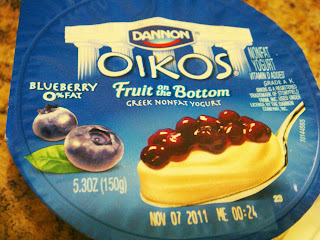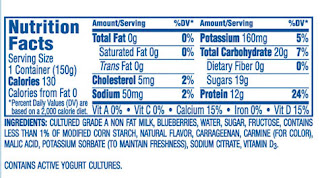Well... I'm not sure if I should call it "international" but yeah they are different yogurt styles from different countries. Or maybe not; maybe it's just a new name that a company came up with and then the rest just follows. But anyways, in my previous post I covered French yogurt. And as I promised, we'll touch on Greek yogurt.
But what's so different about Greek yogurt? I had a chat with other food technologists at work and it seems that currently there is no standard of identity established. Most "new trend" foods don't have standards of identity. A good example to illustrate this is frozen yogurt. There is no definition of how much yogurt it should contain, how much fat, how much milk particles, etc. to make it definable as "frozen yogurt". Another example is smoothie. When you ask people, "what is a smoothie?", they will give you different answers. Fruit puree? Fruit juice? Fruit with ice? With yogurt? Certainly it's a cold beverage, but there is no standard as to what kind of ingredients and at what level they should be, should not be, or must be included.
Greek yogurt is basically concentrated yogurt. The whey protein is removed from the yogurt, making it close to the consistency of a cheese.
But hey, beware: apparently there is a difference between Greek yogurt and Greek-style yogurt.
And if you look closely at the ingredients statement on Dannon's Greek yogurt displayed on the website (note: on the package it says "Greek Yogurt" and not "Greek Style Yogurt")
I started with Dannon just because I'm a big fan of Dannon's Activia and I have seen my coworkers enjoying it.
It certainly looks a little thicker than normal yogurt.
But what's so different about Greek yogurt? I had a chat with other food technologists at work and it seems that currently there is no standard of identity established. Most "new trend" foods don't have standards of identity. A good example to illustrate this is frozen yogurt. There is no definition of how much yogurt it should contain, how much fat, how much milk particles, etc. to make it definable as "frozen yogurt". Another example is smoothie. When you ask people, "what is a smoothie?", they will give you different answers. Fruit puree? Fruit juice? Fruit with ice? With yogurt? Certainly it's a cold beverage, but there is no standard as to what kind of ingredients and at what level they should be, should not be, or must be included.
Greek yogurt is basically concentrated yogurt. The whey protein is removed from the yogurt, making it close to the consistency of a cheese.
But hey, beware: apparently there is a difference between Greek yogurt and Greek-style yogurt.
What is the difference between Real Greek yoghurt and Greek "style" yoghurt?(Obtained from http://www.greekyoghurt.com.au/component/option,com_page/id,3/Itemid,27/)
Real Greek yoghurt is made using natural ingredients (milk and honey) and has a thick, creamy consistency due to the traditional techniques applied to make Greek yoghurt. Greek "style" yoghurt contains one or more of the following ingredients; cream, gelatine, gum blends, stabilizers, preservatives, non-fat milk solids and milk solids. Greek "style" yoghurt is thick because of these thickening agents. Greek "style" yoghurt is not Real Greek yoghurt
And if you look closely at the ingredients statement on Dannon's Greek yogurt displayed on the website (note: on the package it says "Greek Yogurt" and not "Greek Style Yogurt")
it contains carrageenan. It's a gum used to thicken a system. They did strain the whey out using traditional methods (or so the website says) but what's this carrageenan doing here? I guess it makes more sense if you remember that this Dannon Greek yogurt is non-fat. Without the use of gums, it would have a "dry", non-creamy texture. Forgivable? Yes, I'd consider that forgivable.
And I guess instead of honey, they use sugar (sucrose) and fructose (the main sugar in honey and plant-based ingredients). Probably cheaper and easier to use than honey when you think about large scale productions. Forgivable.
Overall I prefer Greek yogurt than French yogurt.
Next on international yogurt: Icelandic skyr (yogurt)




















0 comments:
Post a Comment
Comments are welcome, but please comment responsibly :)